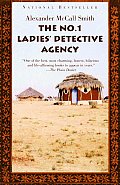
| Series: | Detective Agency #1 |
| Publisher: | Anchor |
| Copyright: | 1998 |
| Printing: | August 2002 |
| ISBN: | 1-4000-3477-9 |
| Format: | Trade paperback |
| Pages: | 235 |
Precious Ramotswe had been living with and caring for her father, who had built up a good-sized herd of cattle over his life. When he dies, he tells her on his deathbed to sell the herd and buy a store, whatever store would make her happy. So, she does. She buys a house, and she starts a detective agency, the only ladies' detective agency in the nation of Botswana.
As one might expect of a national best-seller that's spawned, to date, five sequels telling of Mma Ramotswe's cases and musings, this is a light-hearted, happy sort of book. Mma Ramotswe, as we learn from flashbacks that tell her life story, was a brilliant, observant child with an exceptional memory and mathematical ability. An unhappy and unfortunate marriage is behind her, she's independent and capable. Both her detective work and her thoughts on life are full of a simple, honest wisdom, keen observation of people, and a way of finding quiet and effective methods of solving problems without involving the authorities.
The book is also full of descriptions of Botswana: the dry, open landscape, dusty roads, beautiful sunrises, and huge empty spaces. Smith weaves these into the story, following Mma Ramotswe's sometimes rambling trains of thought rather than leading the reader on a tour, so the scene is set with glimpses, flashes, and moments. That keeps the book moving as well, and at 235 pages, it's a good afternoon read that doesn't wear out its welcome.
Smith isn't aiming for heavy emotional weight and Mma Ramotswe's attitude is perhaps best-described as optimistic pragmatism. She touches from time to time on the pains and problems of Africa, and her own past isn't very happy, but she never dwells on such things. The philosophical attitude of the book is best summed up by one of her musings:
She stopped. It was time to take the pumpkin out of the pot and eat it. In the final analysis, that was what solved these big problems of life. You could think and think and get nowhere, but you still had to eat your pumpkin. That brought you down to earth. That gave you a reason for going on. Pumpkin.
Still, perhaps because they're such a contrast, her few moments of remembered grief are moving, little short shocks of emotion in the middle of practical problem-solving.
The charm of her mysteries is that they're often quite simple, the sorts of things one could believe small-town people would bring to a detective. This isn't the sort of mystery with a complex plot, dramatic revelations, or red herrings. She dispatches around a half-dozen investigations over the course of the short book and mostly makes the right guesses. The fun is in her observant, common-sense approach, her honesty and emphasis on communication, and her way of finding appropriate and positive resolutions for most of the problems.
This is light reading, a good book to cheer one up, and a fast novel for a lazy afternoon. Not the place to turn if you're looking for something meaty and thought-provoking, but I can understand why it's been so popular and why one would go through the whole series.
Reviewed: 2007-10-24